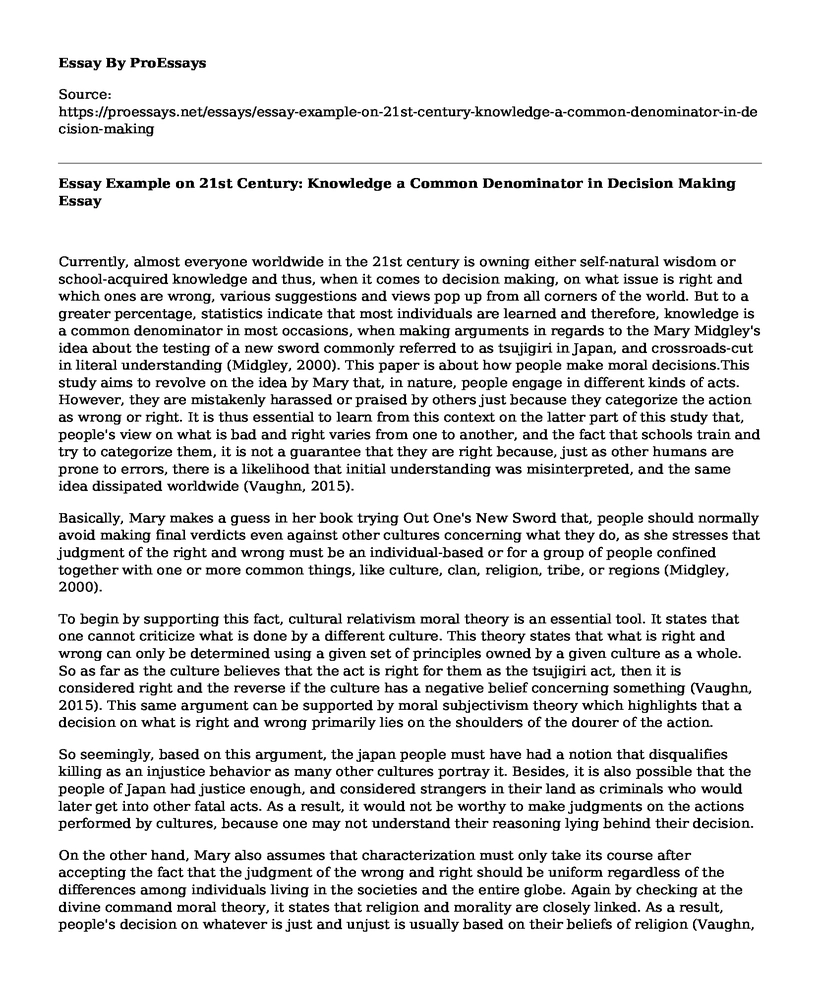Currently, almost everyone worldwide in the 21st century is owning either self-natural wisdom or school-acquired knowledge and thus, when it comes to decision making, on what issue is right and which ones are wrong, various suggestions and views pop up from all corners of the world. But to a greater percentage, statistics indicate that most individuals are learned and therefore, knowledge is a common denominator in most occasions, when making arguments in regards to the Mary Midgley's idea about the testing of a new sword commonly referred to as tsujigiri in Japan, and crossroads-cut in literal understanding (Midgley, 2000). This paper is about how people make moral decisions.This study aims to revolve on the idea by Mary that, in nature, people engage in different kinds of acts. However, they are mistakenly harassed or praised by others just because they categorize the action as wrong or right. It is thus essential to learn from this context on the latter part of this study that, people's view on what is bad and right varies from one to another, and the fact that schools train and try to categorize them, it is not a guarantee that they are right because, just as other humans are prone to errors, there is a likelihood that initial understanding was misinterpreted, and the same idea dissipated worldwide (Vaughn, 2015).
Basically, Mary makes a guess in her book trying Out One's New Sword that, people should normally avoid making final verdicts even against other cultures concerning what they do, as she stresses that judgment of the right and wrong must be an individual-based or for a group of people confined together with one or more common things, like culture, clan, religion, tribe, or regions (Midgley, 2000).
To begin by supporting this fact, cultural relativism moral theory is an essential tool. It states that one cannot criticize what is done by a different culture. This theory states that what is right and wrong can only be determined using a given set of principles owned by a given culture as a whole. So as far as the culture believes that the act is right for them as the tsujigiri act, then it is considered right and the reverse if the culture has a negative belief concerning something (Vaughn, 2015). This same argument can be supported by moral subjectivism theory which highlights that a decision on what is right and wrong primarily lies on the shoulders of the dourer of the action.
So seemingly, based on this argument, the japan people must have had a notion that disqualifies killing as an injustice behavior as many other cultures portray it. Besides, it is also possible that the people of Japan had justice enough, and considered strangers in their land as criminals who would later get into other fatal acts. As a result, it would not be worthy to make judgments on the actions performed by cultures, because one may not understand their reasoning lying behind their decision.
On the other hand, Mary also assumes that characterization must only take its course after accepting the fact that the judgment of the wrong and right should be uniform regardless of the differences among individuals living in the societies and the entire globe. Again by checking at the divine command moral theory, it states that religion and morality are closely linked. As a result, people's decision on whatever is just and unjust is usually based on their beliefs of religion (Vaughn, 2015). If this is the case, then Mary must have been wrong, because the culture is not linked to religion whatsoever. Culture is a group character while religion is a personal character.
Therefore, the activities such as tsujigiri can be faulted as wrong by other individuals who are of the same religion but from other countries or regions. Also, the view of Mary concerning testing one's new sword can be undermined by studying the virtue ethics of moral theory. This principle which is also supported by the late Aristotle, states that the characterization of right and wrong should only be done based on the traditional norms which also stipulated that every person aspired to live in a happy life (Heinaman, 2018). Based on virtue ethics, the right action can be seen if:
- The immediate end of the result leads to happiness
- Happiness must be an action built following purpose
So basically, the argument which states that there are a clear distinction and a real categorization of right and wrong outweighs the side which tends to reason that the decision or verdict of wrong and right is a mere function that relies on the concept of culture or the personal beliefs. It, therefore, goes without saying that, it is most likely that tsujigiri must have been an unfair act as it failed to result into an event that leads to happiness which was by various reasons, that clearly distinguished all the features in the japan understanding of the traditional and international virtues.
References
Heinaman, R. A. (2018). Aristotle and moral realism. Routledge.
Midgley, M. (2000). Trying out one's new sword. Courses Publishing.
Vaughn, L. (2015). Doing ethics: Moral reasoning and contemporary issues. WW Norton & Company.
Cite this page
Essay Example on 21st Century: Knowledge a Common Denominator in Decision Making. (2023, Mar 12). Retrieved from https://proessays.net/essays/essay-example-on-21st-century-knowledge-a-common-denominator-in-decision-making
If you are the original author of this essay and no longer wish to have it published on the ProEssays website, please click below to request its removal:
- The Five Competitive Forces that Shape Strategy
- The Manager as a Leader - Paper Example
- How to Improve Discipline and Conflict Resolution? - Paper Example
- International Business and Walmart Paper Example
- The Concept of Data Governance Essay Example
- Wal-Mart: A Cost Leader With Focus on Stakeholders - Essay Sample
- Exploring Director Remuneration & Stock Repurchases: Conflict of Interest or Immoral? - Essay Sample







